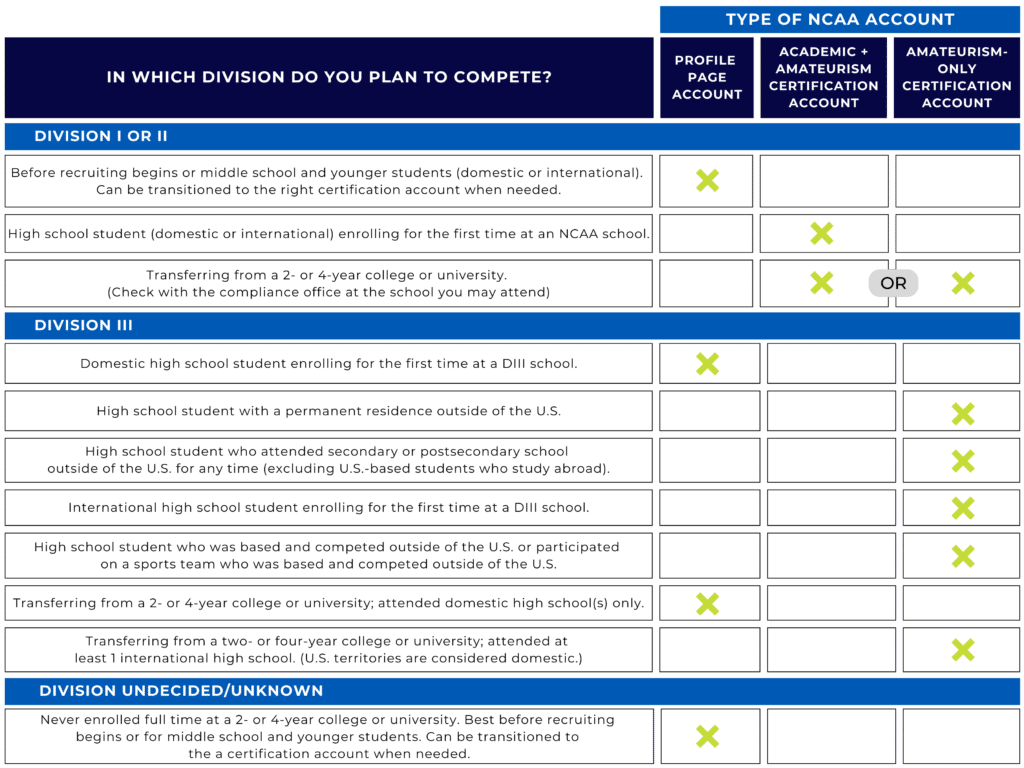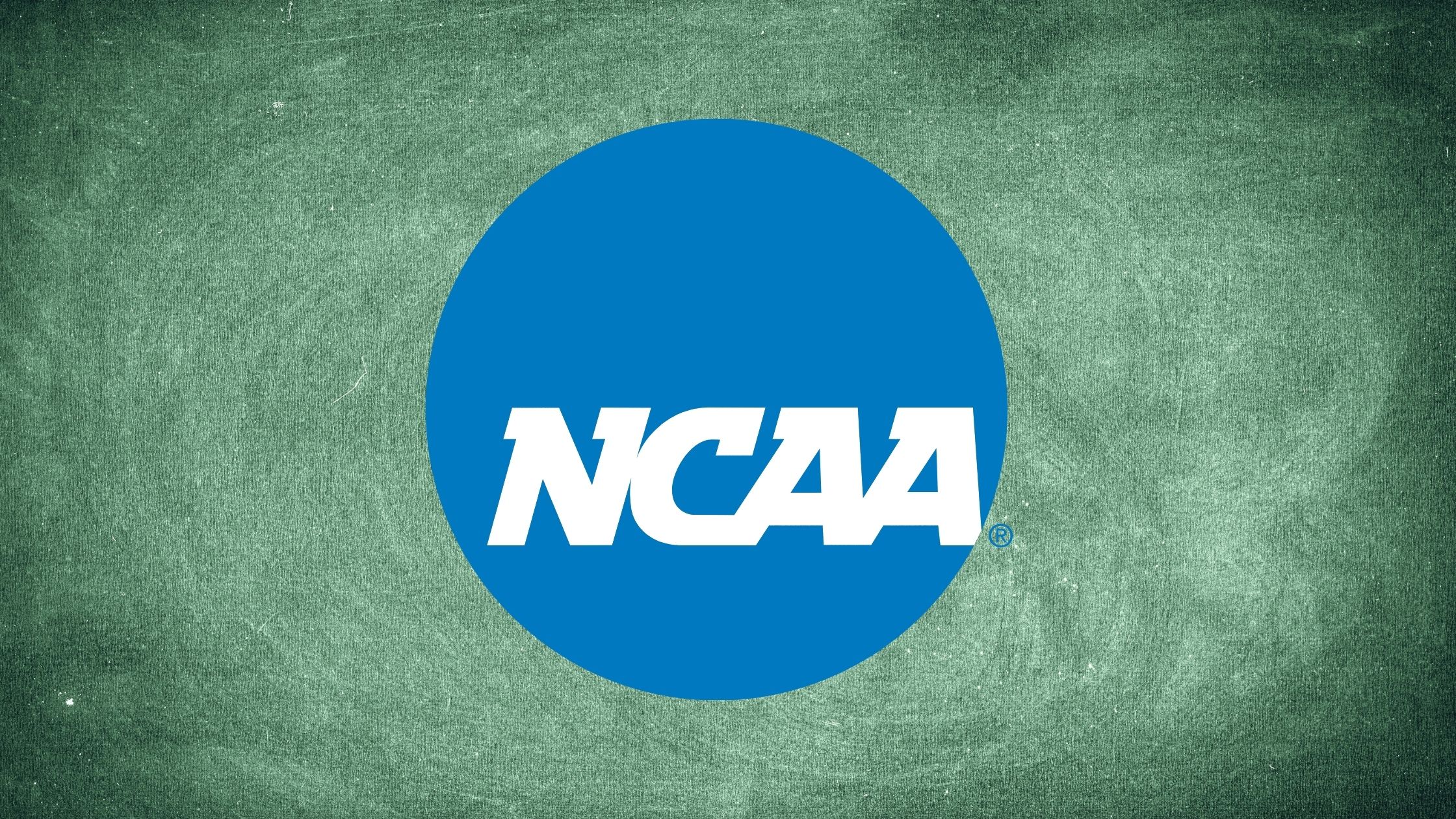How to Register with the NCAA Eligibility Center
Updated on Jul 24, 2025

As a student-athlete looking to play sports at an NCAA school, you need to certain academic standards and at the NCAA Division I and Division II levels – you must be certified by the NCAA Eligibility Center in order to be cleared to compete.
In order to be evaluated by the Eligibility Center, the first step is to register with the NCAA Eligibility Center. Registration involves answering online questions about your academic history and sports experiences, as well as submitting your high school transcripts and confirming your amateurism status.
The NCAA Eligibility Center also offers a free registration option for undecided students who don’t know yet if they will compete at the NCAA Division I (DI) or Division II (DII) levels
To help clear the path to become an NCAA student-athlete, Honest Game has outlined the process for registering with the NCAA Eligibility Center.
What is the NCAA Eligibility Center?
Previously known as the NCAA Clearinghouse, the NCAA Eligibility Center determines the academic eligibility and amateurism status for all DI and DII student-athletes.
Initial Eligibility is based on high school academic progress and completion and dictates whether a student can participate in NCAA DI/DII athletics or if they can take an athletic scholarship.
College-bound student-athletes who want to practice, compete and receive athletic financial aid during their first year at a DI or DII school need to meet the following requirements:
- Graduate from high school
- Complete a minimum number of NCAA-approved core courses
- Earn a minimum required grade-point average in core courses, known as the NCAA Core GPA
- Request final amateurism certification from the NCAA Eligibility Center
The NCAA does not set initial-eligibility requirements for athletes looking to compete at the DIII level, however, DIII colleges and universities have their own admission standards.
What Type of NCAA Account Do Student-Athletes Need?
All student-athletes looking to study and compete at an NCAA DI or DII school must register with the Eligibility Center at eligibilitycenter.org.
There are three different types of accounts depending on the division you are looking to play at and whether you are a domestic or international student-athlete.
Free Profile Page Account: For domestic students registering to play at NCAA-sponsored basketball events; students younger than ninth grade; or those unsure of which division they want to compete in, the Profile Page Account is the best place to register.
Honest Insight: Profile Page account registrants receive an NCAA ID and important reminders from the Eligibility Center as they progress through high school. Students can register for the free Profile Page account as early as their freshman year (or year nine of secondary school), as these accounts can be transitioned to a paid Certification Account at any time.
Amateurism-Only Certification Account: All international student-athletes who plan to compete at a DIII school, as well as domestic student-athletes transferring from a two-year school to an NCAA DI or DII school who have not previously been certified, must create and pay for the Amateurism-Only Certification Account. Effective September 2022, this account includes a $70 required fee for all student-athletes. (This account type is not available until mid-September 2022.)
Academic and Amateurism Certification Account: For students wanting to compete at an NCAA DI or DII school, be placed on a school’s Institutional Request List (IRL), sign an athletic grant-in-aid, or are preparing to take an official visit they must create and pay for an Academic and Amateurism Certification Account. Effective September 1, 2022, this account includes a $100 required fee for domestic students/$160 for international students. (This account type is the same as the Certification account currently available. The new Academic and Amateurism Certification account is not available until mid-September 2022.)

What Do You Need to Register with the NCAA Eligibility Center?
The NCAA Eligibility Center registration process may take some time depending on when you are registering and which account you are looking to complete. Honest Game recommends preparing the following list of items prior to beginning the registration process.
- Valid email address – Be sure to use an email that is frequently checked and one that you will have access to after high school. The email you provide is where the NCAA will contact you if they have any questions about your account or require you to take additional steps.
- Basic education history – Include a list of all high schools or secondary schools you have attended and the dates during which you attended them.
- Sports participation history (Certification Accounts only) – Add details about any teams with which you have practiced or played or events in which you participated, as well as information about any individuals that have advised you or marketed your skills.
- Payment (Certification Accounts only) – Effective 9/1/2022, the registration fee is $100 for students from the United States and its territories and Canada, and $160 for students from all other countries. You must pay online by debit, credit card or e-check. Some students may be eligible for a fee waiver (see below for additional information).
Honest Insight: When creating an Academic and Amateurism Certification Account, students will need to have the school NCAA portal administrator upload the official transcript (from all schools attended) and have the College Board or ACT.org send score reports directly to the NCAA Eligibility Center. School portal administrators could be a counselor or other staff members designated by the school to assist with NCAA compliance.
Top 4 Tips for Completing Your NCAA Certification Account
Student-athletes are not officially done with the NCAA Eligibility Center process until they are done with high school and officially declared eligible. Below are tips to ensure that you are on track to have your account certified by the NCAA Eligibility Center.
1. Stay on Top of Eligibility Center Tasks: You will receive an email from the NCAA Eligibility Center when you are assigned a new task. Be sure to respond to each task as quickly as possible so they have all the information needed to complete your certification.
2. Keep Your Academic Records Up-to-Date: Ask your school counselor to send up-to-date transcripts to the NCAA and NAIA Eligibility Center after finishing your sixth semester of high school (typically junior year for most students).
The NCAA requires prospective DI athletes to complete 10 NCAA-approved core courses before the start of your 7th semester of high school. Specifically, 7 of those 10 courses MUST be in the subject areas of English, Math, or Natural/Physical Science. This core-course progression requirement is known as the “10/7 Rule” or “10/7 Lock”.
Honest Insight: Registering with the NCAA Eligibility Center will not trigger an academic review and will not complete your certification until your final transcript is submitted upon graduation or if you are deemed an Early Qualifier. Make sure you’re completing the academic requirements each school year. If there is an issue when the NCAA Eligibility Center reviews your academic eligibility, it may be too late to recover.
To ensure that you’re on track with the eligibility process, Honest Game’s CARE® (College Athletic Report on Eligibility) provides an individualized report that includes an NCAA GPA calculator, NCAA credit tracking, and a clear view of a student-athlete’s academic eligibility status, as well as their NCAA 10/7 progression.
CARE® is downloadable and easy to share with parents/guardians, high school administrators and college recruiters to make sure everyone is on the same page before it’s too late.
3. Send Final Academic Records to the Eligibility Center: After completing high school, be sure to confirm your school counselor has sent your final high school transcript (with proof of graduation) to the NCAA or NAIA Eligibility Center.
When a final official transcript with proof of graduation are submitted for a student-athlete’s Eligibility Center account, that account becomes “Ready to Process—Final.” This means the student’s account is ready to be reviewed by Eligibility Center staff for an attempt at a final certification decision (needed for a recruit to play once they reach their NCAA college campus).
4. Request Amateurism Certification: To play sports at an NCAA DI or DII institution, student-athletes must follow NCAA amateurism rules about receiving a salary or prize money for athletic participation, such as playing with a professional team.
If graduating high school in the spring or later in June, you may log in to your eligibilitycenter.org account after April 1 of your senior year to request your final amateurism certification. If you plan to graduate early in the winter, you may request your final amateurism certification after October 1 of your senior year.
How Much Does It Cost to Sign Up for the NCAA Eligibility Center?
Profile Page Accounts are free and do not include a registration fee unless they are transitioned to a Certification Account.
Your Certification account will be eligible for processing once the registration fee is paid or waived. (Effective 9/1/2022, fees are nonrefundable 30 days after the account is created.) You must pay online by debit, credit card or e-check. Effective 9/1/2022, the registration fee is $100 for students from the United States and its territories and Canada; and $160 for students from all other countries.
If you qualify for a fee waiver on the SAT or ACT, there is an option in the NCAA Eligibility Center registration payment section to indicate you are eligible to receive a fee waiver. Ask your high school counselor to confirm your fee waiver eligibility through the NCAA Eligibility Center’s High School Portal after you have completed your Certification account registration.
Navigating NCAA Eligibility Center Accounts: A Guide for High School Athletic Directors, Counselors, and Administrators
In a recent webinar with the NCAA Eligibility Center, Honest Game provided easy-to-follow steps to help high school athletic directors, school counselors, and administrators guide their student-athletes through the NCAA Eligibility Center account process. During the webinar, we explained how to set up and manage accounts, reviewed the different account types, and shared step-by-step tips to make the entire process simpler for both schools and students.
Interested in learning more? Fill out the form below to watch Honest Game’s webinar:
Honest Game is here to help simplify the academic eligibility process. Contact us to ensure that you are on track for college sports.

A former High School Athletic Director with more than 14 years of experience, Courtney has guided thousands of student-athletes through the NCAA and NAIA college eligibility and athletic recruiting process.



